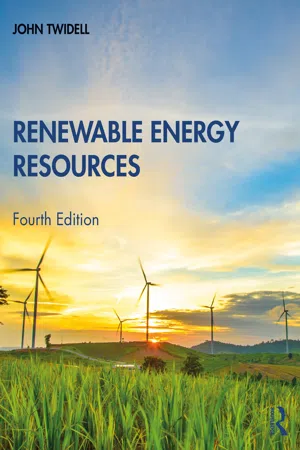
- 890 pages
- English
- ePUB (mobile friendly)
- Available on iOS & Android
Renewable Energy Resources
About this book
Renewable Energy Resources is a numerate and quantitative text. It covers the many renewables technologies implemented worldwide by harnessing sustainable resources, mitigating pollution and climate change, and providing cost effective services.
This fourth edition is extensively updated by John Twidell with global developments as underpinned by fundamental analysis and illustrated by case studies and worked examples. Efficiency of end-use and cost-effectiveness is emphasized. Each chapter begins with fundamental scientific theory, and then considers applications, environmental impact and socio-economic aspects, before concluding with Quick Questions for self-revision, Problems and new Exercises. Basic theory underlying the technologies is covered in succinct Reviews of electrical power, fluid dynamics, heat transfer and solid-state physics. Common symbols and cross-referencing apply throughout; essential data are tabulated in Appendices.
Renewable Energy Resources supports multidisciplinary master's degrees in science and engineering, and specialist modules at undergraduate level. Practicing scientists and engineers will find it a useful introductory text and reference book.
Tools to learn more effectively

Saving Books

Keyword Search

Annotating Text

Listen to it instead
Information
Table of contents
- Cover Page
- Half-Title Page
- Endorsements Page
- Title Page
- Copyright Page
- Contents
- Preface
- Acknowledgments
- Figure and photo acknowledgments
- List of symbols
- List of abbreviations
- 1 Principles of renewable energy
- 2 Solar radiation characteristics and impacts, including the greenhouse effect
- 3 Solar water heating
- 4 Other solar thermal applications
- 5 Photovoltaic (PV) power technology
- 6 Hydropower
- 7 Wind resource
- 8 Wind power technology
- 9 Biomass resources from photosynthesis
- 10 Bioenergy technologies
- 11 Wave power
- 12 Tidal-current and tidal-range power
- 13 Ocean gradient energy: OTEC, DOWA and osmotic power
- 14 Geothermal energy
- 15 Energy systems: integration, distribution and storage
- 16 Solar buildings and efficient energy use, including transportation, manufacture and homes
- 17 Institutional and economic factors
- Review 1 Electrical power for renewables
- Review 2 Essentials of fluid dynamics
- Review 3 Heat transfer
- Review 4 Solid-state physics for photovoltaics
- Review 5 Units, labelling and conversions: the ‘algebraic’ method
- App A Units and conversions
- App B Data and fundamental constants
- App C Some heat transfer formulas
- Answers to Exercises at the end of chapters and reviews
- Short answers to selected Problems at the end of chapters
- Index
Frequently asked questions
- Essential is ideal for learners and professionals who enjoy exploring a wide range of subjects. Access the Essential Library with 800,000+ trusted titles and best-sellers across business, personal growth, and the humanities. Includes unlimited reading time and Standard Read Aloud voice.
- Complete: Perfect for advanced learners and researchers needing full, unrestricted access. Unlock 1.4M+ books across hundreds of subjects, including academic and specialized titles. The Complete Plan also includes advanced features like Premium Read Aloud and Research Assistant.
Please note we cannot support devices running on iOS 13 and Android 7 or earlier. Learn more about using the app